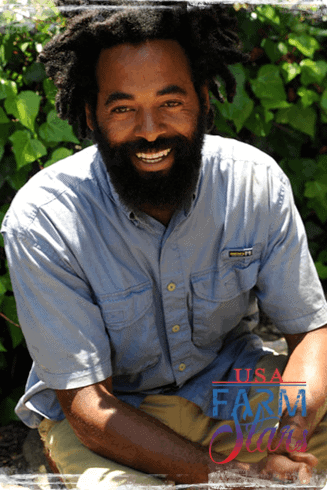
HOME TOWN: Cerritos, CA
FARM NAME & LOCATION: Good Shepard Agroecology Center, Atlanta, GA
FARM TYPE / CROPS: Seasonal produce, native medicinals, fruit trees
WHY WE CHOSE EUGENE:
Eugene, an urban farmer, has been creating life by growing food and building creative communities based on art and sustainable living. He is a true Farm Star because of his passion to help people learn how to grow their own food in their homes, schools, and communities.
FAVORITES:
- Music: Live music made by humans using real instruments.
- Food: Fresh food in season and grown by loving people.
- Drinks: Spirulina, Sea Moss
- Blue Jeans: R.E.I. and Kuhl. They’re strong.
- Thing to do AFTER work: Meditate
- Mantra: Gratitude. Stay grateful and say thank you as many different ways as I can. “Abundance. Gratitude. Abundance. Gratitude.”
Married.
Do you have children? Do they work on the farm with you?
I have two sons and a daughter and yes, they work on the farm. They’ve always grown food so it’s a natural thing for them.
Where is the farthest you have traveled to? Where would you like to go?
The farthest I’ve traveled to is east Africa, to Kenya and Tanzania for work. I’m really interested in going to places I’m invited to because I’ve had the best experiences there. It opens the door to the soil, land, culture, music, people – that’s the way I prefer to travel.
What is your attitude about money?
I think money is an easy way of transferring energy, and it's only effective for this period we’re living in. It’s a great tool to use as long as it’s effective.
How did you get into farming?
I was introduced to it by my mother’s father who was a farmer in Kansas. I became serious about growing food when I became a father in 1999 and then it just blossomed. Once I started growing, other families wanted me to help them so we could become more self-sufficient.
What was the hardest part getting started?
Hardest part is realizing it was not common, or people didn’t understand the need. People not understanding why it’s necessary is still a problem.
What surprised you about farming?
A surprise that really came out of it learning of the intimate relationship between farming and women. When I got involved with farming, 80% of the world’s growers were women.
Tell us about a day on the farm. When does your day start and end?
The day will start at 7am and end at 8pm during the winter season. Also, because of the new local growing in urban areas my days consist of working with volunteers, then a break with meetings with non profit organizations, schools, etc. Then it’s back to the farm for night time farming chores like watering and mapping out new spaces. In the summer, it’s basically the same thing and depends what the sun is doing.
What makes you happy during a day on the farm?
Putting my bare feet on the ground and taking time to listen. Listening to what’s happening with traffic, the wind, the birds. That’s what makes me happy.
What makes you frustrated?
Yeah, there is something that makes me frustrated but I don’t know if it’s good to give power to it. I keep my attention on what makes me happy.
Any lessons learned on the farm?
Surrender. Accept. Adapt. Important lessons I learn on a regular basis.
What do you think a big misconception is about farming or farmers?
The misconception that farmers are unintentional. People believe our lives as farmers are not because we chose it or because we love it but because we inherited it or it’s a misfortune. The misconception about farming in general is the value of the system of farming. The value is misconstrued because corporate agriculture removes the sacredness from farming.
Any advice to other farmers?
My advice would be to continue to encourage a dynamic, fluid relationship with land and ecology where they’re growing.
Anything to say to people who aren’t farmers?
The same advice, just BEGIN to cultivate a relationship with the natural world – whether it’s farming or spending time in nature. All around us there are plants here to help and we won’t know that unless we immerse ourselves in nature.
What concerns you the most about the future of farming?
What concerns me the most about the future of farming is the Codex Alimentarius – the interference of corporate warfare through the genetic modification of food. That concerns me.
Where do you think you'll be in 5 or 10 years? I will be closer to the equator, barefoot and with seeds in my pocket – eating some really nice fruit.


Comments